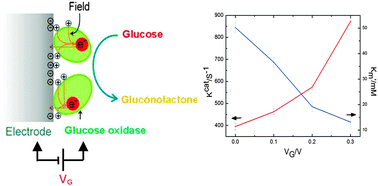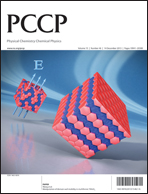Voltage-controlled enzyme-catalyzed glucose–gluconolactone conversion using a field-effect enzymatic detector†
Abstract
The field-effect enzymatic detection (FEED) technique was used to control the kinetics of the enzymatic conversion of glucose to gluconolactone. The glucose–gluconolactone conversion occurring at an enzyme-immobilized electrode, a well-studied process, was confirmed using mass spectrometry. Electrochemical studies showed that the glucose oxidation current depends on the gating voltage VG and the ion concentration of the sample solution. Additionally, the depletion of glucose in the sample also showed a dependence on VG. FEED was used to detect H2O2 on the zepto-molar level in order to show the ultrasensitive detection capability of the technique. These results, while providing evidence for the proposed mechanism of FEED, indicate that VG controls the conversion process. The effect of VG on the glucose–gluconolactone conversion was demonstrated by the observed VG-dependent kinetic parameters of the conversion process.


 Please wait while we load your content...
Please wait while we load your content...